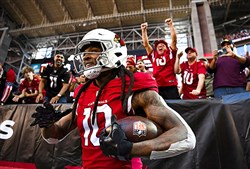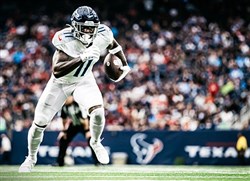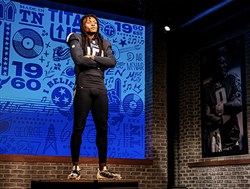VOL. 47 | NO. 31 | Friday, July 28, 2023
Can Hopkins reverse the Titans’ free agent wide receiver curse?
By Terry McCormick
For all the ups and downs the Tennessee Titans have experienced in their 27 years in the Volunteer State, one thing has remained constant: utter futility in finding productive wide receivers in the free agent market.
That’s not to say the receivers the Titans have brought in haven’t been quality players. They have been – for their previous teams.
It began in 1998 with Yancey Thigpen, followed by Carl Pickens the next season and continued on through Eric Moulds, Randy Moss, Andre Johnson and, most recently, Julio Jones.
Each of those receivers came to Tennessee in some form or fashion with a top-flight resume, and in almost every instance they ended up as bottom-rung players for the Titans. (See the accompanying story for how little production the Titans got from each of these free agents in their time in the two-tone blue.
As training camp opened this week for the Titans, the latest to try and buck that trend of disappointment arrived in 31-year-old DeAndre Hopkins, a salary cap casualty in May from the Arizona Cardinals, who signed for a reported $26 million over two seasons.
It would be easy to lump Hopkins in with all the other disappointments of the past and be skeptical that he can succeed in Tennessee in the latter stages of his NFL career.
But there are those who believe Hopkins has a chance to buck that trend and give a measure of productivity to a young Titans wide receiver room that definitely needs to find some reliable targets for quarterback Ryan Tannehill.
Why it might work
One reason Hopkins shouldn’t automatically be labeled a failure before he puts on a Titans uniform is the fact that coach Mike Vrabel and general manager Ran Carthon can’t be blamed for any of the past signings that didn’t work out – except perhaps former Falcons receiver Julio Jones, who was coached by Vrabel but was acquired in a trade by former general manager Jon Robinson.

Former Cardinals wide receiver DeAndre Hopkins played seven season for the Houston Texans and three for the Arizona Cardinals after his college career at Clemson.
-- Photo Courtesy Of The Arizona Cardinals | Caitlyn EpesAn AFC front office personnel man, speaking on the condition of anonymity, made that point and also says Hopkins has a chance to succeed because he is a known commodity to Vrabel and offensive coordinator Tim Kelly, who coached Hopkins when both were in Houston.
“It’s different regimes, so you really can’t compare all of it,” the executive says. “Besides, there is some familiarity there between the player and the coaches, so that will make a difference.
“Had anybody there really worked with Julio? I don’t know, maybe I’m wrong, but I can’t remember anybody in the building that was really connected to Julio.”
A former NFL scout who now works as a consultant for teams and agents agreed with that assessment, carrying it a step further in pointing out that Hopkins fits the mold of what the Titans have looked for in receivers over the past several years, since Vrabel became head coach.
“The Titans haven’t had any speed receivers under this new regime,” the scout says. “They’ve always gone with guys who are a little bit bigger, a little bit stronger than they have the speed element. This kind of fits the mold a little more with what they like to do.”
In fact, the most productive receiver in Titans history – Derrick Mason, who put up four consecutive 1,000-yard receiving seasons for the club (2001-04), says he believes Hopkins can be a fit in the Titans offense and just as important, in the team’s culture.

A.J. Brown seemed poised to be the next great receiver for the Titans. Then he was traded after three seasons to the Eagles during the 2022 draft. He helped them to the Super Bowl.
-- Photograph Courtesy Of The Tennessee Titans | Donald Page“Being a veteran guy, I would assume he understands the game the way he needs to understand it, so he will fit in just about any place he would have chosen to go,” says Mason, now a staple on Nashville sports talk station 102.5 The Game. “To me, he seems like a guy who just wants to play football and he doesn’t seem like an uncoachable person. I think he’ll fit into that locker room and do his best to fit in with the offense and what they’re asking him to do.”
Why the past failures?
With the notable exception of Mason, his Titans teammate Drew Bennett and more recently, A.J. Brown, the Titans franchise has simply not done a good enough job of drafting wide receivers. Except for that trio, the franchise’s draft boards have been littered with picks high and low that didn’t pan out for numerous reasons.
High picks like Kenny Britt, Tyrone Calico, Justin Hunter and Kendall Wright all had flashes of success and, in Wright’s case, even had a 1,000-yard receiving season.
But none were able to sustain any productivity over the long haul. Add in the middle and late-round picks who didn’t do much, and it has left an ongoing, gaping void at one of the most important skill positions on the field.
With the draft picks not panning out, the Titans have turned time and again to free agency to try and pick up the slack, and the results have not been pretty. In most cases, the player was simply incapable of delivering what the Titans and their fans needed.
Mason offers a simple explanation: The players brought in were nearly all in the twilight of their careers, and asking them to be a No. 1 receiver in a new offense at that juncture of their playing career was simply too much.

Hopkins missed the first six games of 2022 after testing positive for performance-enhancing drugs. He had 64 catches for 717 yards and three touchdowns in nine games.
-- Photograph Courtesy Of The Tennessee Titans“I think with those guys they were truly at the end of their careers. Carl Pickens had hamstring issues before he came to Tennessee, and it just continued. Carl was basically at the end of his career,” Mason says. “Same for Eric Moulds. His better days were behind him. Andre Johnson, (Eric) Decker, Julio Jones, same thing.
“And it was obvious in watching all those guys play that their prime was gone and the Titans were bringing them in hoping they could rekindle a bit of what they used to be. It just didn’t work out.”
The former scout says that Jones was one of the best examples of a guy who was simply used up by the time the Titans traded for him.
“Julio (Jones) is one of the tougher players in the NFL at that position ever. He’s played through so much, but at some point, it catches up to your body,” the scout says. “I don’t care how tough you are or how talented you are, it always comes back and hurts you. It wasn’t that he didn’t want to, but he just didn’t have the juice anymore.
“The Titans needed him to be a guy,” the scout continues. “They traded for him to be a guy and they paid him to be a guy, but he just couldn’t be that guy.”
The AFC front office executive says that the age/injury factor was one of the reasons his own club didn’t make a run at Hopkins.
“It’s always risky. It’s one of the reasons why we didn’t put the money out there. There’s just too much risk there,” he says. “You’re talking about a different player, a different fit, can he learn and get up to speed quickly?”
Still trying to replace Brown
The scout echoes that belief that the best free agents don’t often get to the open market, and those who do could be past their prime – something that has bitten the Titans on several previous occasions.
“When you start to go out in free agency, you’re not really going to get an ‘in his prime’ player at that position,” he says. “The rarity was what the Eagles did, trading for A.J. Brown in his prime, and they reaped the benefits of it, and it put the Titans in this hole. Now, they’re trying to dig out.”
Or as Mason puts it, the Titans showed that the receiver position is not a top priority by not finding a way to keep Brown.
“The Titans let you know that when they traded away A.J. Brown that that position wasn’t a premium for them,” Mason says. “There’s no way in hell you should have traded away A.J. Brown. You should have found a way to make it work, but they didn’t.”
For now, the move is back to free agency in hopes that Hopkins can give them a measure of productivity that was missing from the lineup last year.
Last season with the Cardinals, Hopkins was limited to just nine games, serving a six-game suspension for violating the league’s performance enhancing substance policy. Even still, Hopkins was productive when he played with 64 catches for 717 yards, numbers that would have led the Titans in 2022.
Hopkins also dealt with a hamstring injury in 2021 with Arizona, so it should be of some concern that Hopkins hasn’t played a full season since 2020.
“D-Hop is coming off an injury and a suspension, but I don’t think he’s at the end,” Mason says. “He’s not at his peak either, but I think he has a little bit more in the tank than some of these other guys the Titans have brought in.”
What Hopkins can bring
At 31, and having played in just 19 of a possible 34 games the past two seasons, the Titans are hoping Hopkins can bounce back and help steady a shaky receiving corps.
One thing the Titans should be able to rely on with Hopkins, as they did with Brown, is an ability to catch the ball in traffic and win his matchups. It shouldn’t take Hopkins long to earn the trust of Tannehill.
With Brown traded away, it was evident last year that there really wasn’t a go-to receiver that had Tannehill’s complete trust. Hopkins can be that guy, even if he has lost a step.
“To me, DeAndre Hopkins is the best catcher of the football since Larry Fitzgerald and Cris Carter. This guy, if you throw it in his vicinity, history says if it’s anywhere around him, he’s going to come up with the ball,” Mason says. “Now, he’s not a deep threat, but as far as catching the football, he’s the best catcher of the football that I’ve ever seen.”
The scout says Hopkins’ route-running and his overall skill set should give him a better chance to be more productive for more years than guys like Jones or Moss, whose physical talents and gifts were otherworldly in their primes, but faded as they got to the end of their careers.
“Julio was a 4.3 guy, physical and explosive with all the rare physical traits for the position. DeAndre Hopkins is a little bit different,” the scout says. “He’s a guy who was always a great route runner and a hand catcher – someone who did the small things as a receiver. It’s going to allow him to age a little bit better, like a Larry Fitzgerald, for example. He wasn’t a burner, but he could play later in life because he was a good route runner and a hands catcher.
“DeAndre can survive in the NFL at age 31, 32, 33 without having blazing speed, because he’s such a great route runner and hands catcher. Those qualities will allow him to age better than a guy that relies on speed, power and explosive ability.”